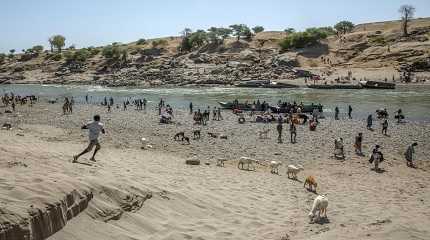
NAIROBI, Kenya (AP) — The United Nations is failing to support hundreds of ethnic Tigrayan members of a U.N. peacekeeping force as they fear returning home to Ethiopia and facing potential detention amid the country’s Tigray conflict, peacekeepers tell The Associated Press.
Their accounts highlight the concerns among Tigrayans after thousands of them, both military personnel and civilians, were detained throughout Ethiopia after the country’s war erupted in November 2020 between Ethiopian forces and fighters from the Tigray region. An unknown number have been released in recent weeks after much of the fighting eased, and Ethiopia this week lifted a state of emergency.
Two Tigrayan peacekeepers told the AP that they and hundreds of colleagues have ended their U.N. peacekeeping stint in Abyei, a region contested by Sudan and South Sudan, and are now expected to return to Ethiopia. They asserted that their peacekeeping camp is under Ethiopian control and U.N. personnel are not allowed access.
Sgt. Angesom Gebru, who slipped away from the camp with a few dozen others, said the remaining Tigrayan peacekeepers can only walk away safely once they are taken to a local airport for flights back to Ethiopia, which began this week. But as Tigrayans refuse to board them, he said, there are fears that those still in the peacekeeping camp could face retaliation.
Dozens of the Tigrayan peacekeepers held a protest against the war in Ethiopia this week. A photo taken and shared by Angesom shows the men and women, with their blue U.N. passes around their necks, standing with a handwritten sign reading “Stop genocide in Tigray.”
The Tigray region of some 6 million people has been largely blockaded by Ethiopia’s government since June of last year as authorities claim that humanitarian aid or other supplies could be used in support of the Tigray forces.
“Fuel, cash and supplies available for humanitarian partners in Tigray are at near-exhaustion level,” the U.N. humanitarian agency said last week.
A spokesman for Ethiopia’s military and government did not respond to questions about the Tigrayan peacekeepers with the U.N. mission. Ethiopia’s government has sought to portray a return to normal at home after the Tigray forces withdrew into their region in December under a drone-supported military offensive.
The two peacekeepers told the AP that Ethiopian authorities at the camp told the Tigrayans they would not be harmed if they returned home. But they said they weren’t reassured, and they and colleagues who left the camp are sheltering with newly arrived peacekeepers from Ghana.
The Tigrayans described themselves as stranded in a remote region on the border between two of the world’s most troubled countries, Sudan and South Sudan.
Officials with the U.N. peacekeeping mission and the U.N. refugee agency did not respond to questions about why the Tigrayans say the U.N. is not allowed to access the Ethiopians’ peacekeeping camp or what help the U.N. is giving the Tigrayans.
It is not clear how many Tigrayan peacekeepers have refused to board the flights home.
Ethiopia is one of the top five troop contributing countries to U.N, peacekeeping missions, and the nation’s war has turned the homecoming of Ethiopian peacekeepers into sometimes fraught, or even physical, affairs.
In February 2021, more than a dozen Tigrayan members of the U.N. peacekeeping mission in South Sudan refused to board a flight home when their stay ended. And in April, U.N. spokesman Farhan Haq said a number of Ethiopians in the U.N. peacekeeping mission in Sudan’s Darfur region sought “international protection” as several hundred troops were being repatriated.
Ethiopia’s government has sought to restrict reporting on the war and detained some journalists under the recent state of emergency. Those still held include a video freelancer accredited to the AP, Amir Aman Kiyaro.




